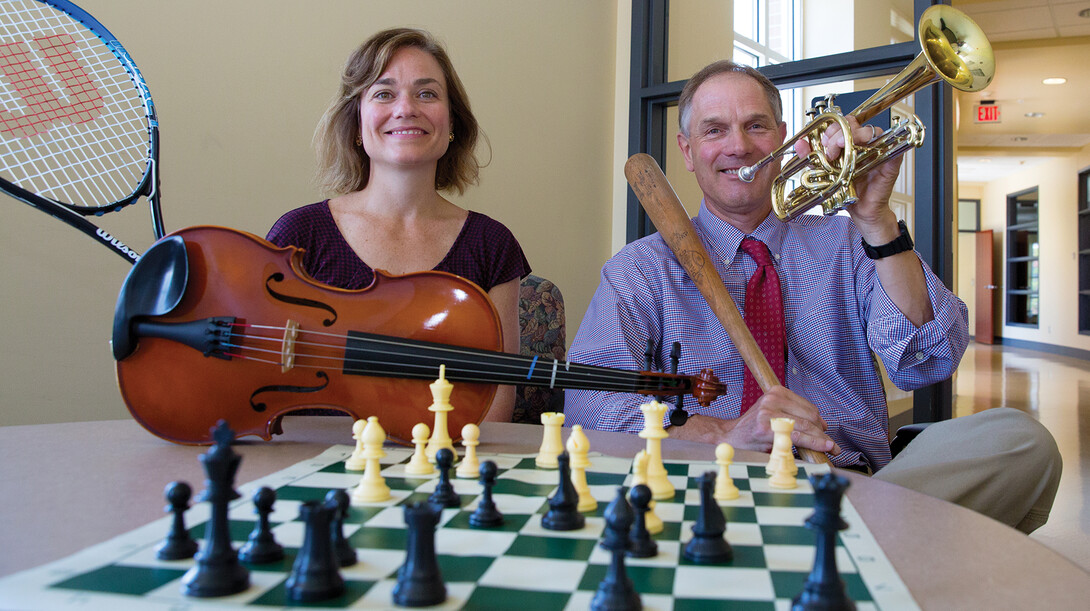
It takes 10,000 hours of dedicated practice for a person can become a world-class talent in a given field, or so said writer Malcolm Gladwell in a 2008 book.
It also helps to have intensely dedicated parents, according to a new study by University of Nebraska-Lincoln educational psychologist Kenneth Kiewra and three former graduate students.
“Talent might partially be born, but it is largely made — made by parents who devote their full measure to fostering their children’s talent development,” Kiewra said.
To learn how parents cultivate talent in their children, Kiewra and his students interviewed the parents of 24 youth with national or world-class standing in their area of talent.
The group of young elites included ice skaters with Olympic medals, world-champion baton twirlers, top-rated chess players, collegiate volleyball players, prize-winning musicians, a pre-teen author, and a national spelling bee champion.
The researchers found parents who had mortgaged their homes, given up their jobs, or liquidated their retirement accounts, among other sacrifices, to nurture their children’s talents.
The study differed from past research because it focused solely on the roles of parents, rather than the child or her mentors. It also gathered “real time” information from parents who were still tending their talented offspring, instead of relying on retrospective accounts. The interview responses were analyzed and organized into themes relating to previous research.
Results showed that parents were instrumental in all aspects of talent development. Parents created an environment where their children’s talents were identified and fostered early, arranged for expert coaching, facilitated intensive practice, and sustained children’s motivation – all factors identified in previous research as key to developing world-class skills.
Some highlights:
Parents often recognized their children’s abilities quite early. Skaters hit the ice as early as 2 years old and musicians began training while still toddlers. The young author learned to read at 3 and was writing stories under her mother’s guidance at age 4.
Many parents served as their children’s first coach, but eventually hired top-level professional coaches for their children. One set of parents moved 200 miles so their skater son could work with an elite coach. The father gave up his job and derailed his career to make the move. The parents of a chess player worked janitorial jobs at night and sold things on eBay to be able to afford a grandmaster coach.
Parents organized their family life around their child’s practices and competitions, home schooling their children if necessary to allow time for practice and competition. One family added a great room with a cathedral ceiling to their house so their daughter could practice her baton twirling. A violinist’s mother sat in on his lessons, taking notes, so she could help him remember what he needed to practice. A chess player’s father estimated the family spent $50,000 for their son to compete in a dozen local, national, and international tournaments in a year.
Parents pushed their children to work hard and stay motivated. The spelling bee champion’s mother nudged her child away from the TV: “It makes you happy, I can see, but you know you have to read. When you watch TV, you’re losing out on your dream.” A musician’s parent reminded her child that it’s a privilege to play an instrument: “With that privilege comes the expectation that you will practice … he never thought about arguing.”
The researchers acknowledged some limitations in their approach. The parents they interviewed were almost all white Americans of middle- to upper-middle class households. The scope of the study did not allow for in-depth examination of cultural influences on parenting. The study authors called for cross-cultural investigations of parents with talented children, as well as how distance education, computer software and other technological advances are making it easier for promising children to develop their talents.
The study, “Parenting Talent: A Qualitative Investigation of the Roles Parents Play in Talent Development,” was published this spring in the Roeper Review. Kiewra’s three UNL co-authors were Amanda L. Witte, Sarah C. Kasson, and Kyle R. Perry. Witte recently earned her doctorate, while Kasson and Perry completed master’s degrees.
“Although the link between natural aptitude and performance area contributes to success, research shows that biological advantages are not sufficient for attaining talent,” the authors wrote. “Certain environmental factors that stem from the parent-child relationship must be in play. And that is certainly the overriding conclusion we draw from the present findings. Parents went to great lengths to build an early environment for talent growth and to later provide optimal coaching, maximize practice and competition opportunities, and fuel desire.”
Though the study involved “supremely talented” children, the authors say it offers insights for other parents who want to help their children reach their full potential.
“In the end, parents’ actions are instrumental, if not critical, to their child’s talent development.”







